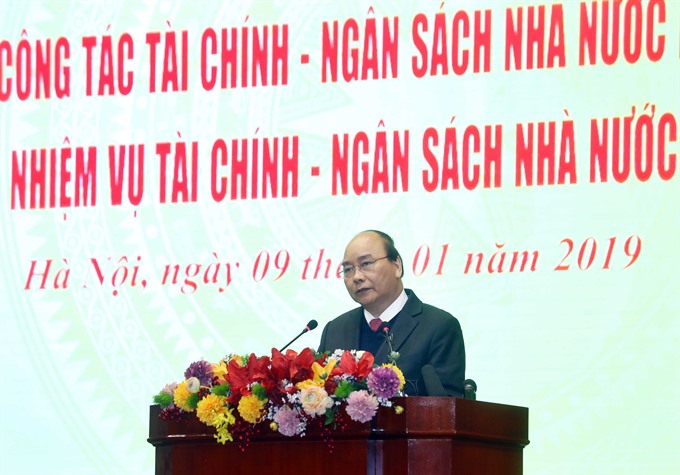Prime Minister Nguyen Xuan Phuc asked the Ministry of Finance to hasten administrative reforms and improve transparency to create favourable conditions for business development.

Prime Minister Nguyen Xuan Phuc asked the Ministry of Finance to hasten administrative reforms and improve transparency to create favourable conditions for business development.
PM Phuc spoke at the ministry’s conference on Wednesday about implementing tasks for 2019 to ensure the stability of policies, simplify tax and customs procedures, and reduce informal charges.
The ministry’s policies must focus on promoting the development of small- and medium-sized enterprises, PM Phuc said.
Minister of Finance Dinh Tien Dung said the focus would be on hastening administrative reforms, especially in tax and customs procedures, to improve the business climate.
The ministry’s report showed that it abolished 18 administrative procedures in 2018 but nearly 150 others needed to be reviewed for removal. Some 111 administrative procedures were simplified and 117 out of 190 business prerequisites were simplified or removed.
In 2019, the ministry plans to study amendments to tax policies with the goal of expanding tax bases and preventing transfer pricing.
Dung said the ministry would step up prevention of trade frauds and tax evasion, and address tax arrears to increase budget revenue.
The ministry’s report showed budget revenue in 2018 was more than VND1.4 quadrillion (US$61.8 billion), 7.8 per cent higher than the target for the year.
The increase in budget revenue gave Viet Nam more resources to handle urgent tasks in socio-economic infrastructure development investment and deal with natural disasters, Dung said.
The ministry set a budget revenue target for 2019 that is 5 per cent higher than the target of VND1.41 quadrillion set by the National Assembly.
Regarding budget spending, the ministry tightened public procurements and recurrent spending but increased spending for development investment. Statistics showed development investments accounted for more than 27 per cent of the total budget spending.
The budget deficit was estimated at less than 3.6 per cent of gross domestic product (GDP) and public debts were less than 61 per cent of GDP, 0.3 percentage points lower than in 2017.
This was the second year Viet Nam saw a decrease in the ratio of public debt to GDP after reaching a six-year high of 63.7 per cent in 2016.
Public debts were restructured to ensure sustainability and solvency with Government bond yields averaging 4.67 per cent per year, 1.31 percentage points lower than in 2017. Investors of Government bonds were diversified with the holdings of commercial banks dropping from 78 per cent in 2016 to 53.1 per cent.
However, the disbursement of public investment for capital construction remained low, Dung said, citing that it met only 67.6 per cent of the plan.
Dung said the ministry would increase the disbursement of public investment but also enhance supervision to increase its efficiency and prevent losses and waste.
The restructuring and divestment of State-owned enterprises would also be hastened, he said.
Bui Van Nam, general director of the General Department of Vietnam Taxation, said the application of electronic invoices would be expanded nationwide. — VNS





